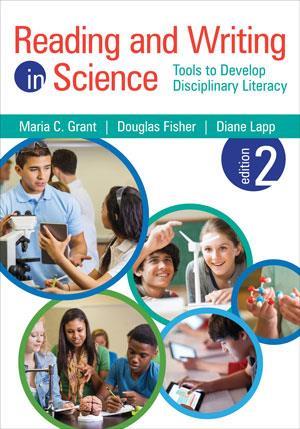Surveying strategies to support learning in literacy and science
Maria C Grant, Douglas Fisher, Diane Lapp
Corwin
2015 | 176pp | £18.99
ISBN 9781483345680
http://amzn.to/1ljN1ry

This book is a useful review of many different approaches to incorporating subject-specific literacy into schemes of work. It is well-researched and referenced with examples of literacy exercises and approaches given throughout. This is very much an academic text rather than a toolkit for teachers and it really needs reading in full to get a good understanding of the wider picture.
The section on writing like a scientist is perhaps the most useful, especially in its emphasis on the many styles of writing needed by modern scientists rather than just the use of the passive voice (which sometimes dominates science writing in schools). There are some excellent examples of opportunities for students to write in a more active style, while avoiding the contrived scenarios sometimes suggested to incorporate extended writing into science curricula.
However, the real strength of the book is the almost equal weighting given to the four strands of literacy; oral, aural, reading and writing. This provides a useful prompt for the reader to go beyond the obvious when incorporating a greater literacy focus into their curriculum.
The book would benefit from an appendix summarising all the exercises relating to the development of the different skills. This would make it much more user-friendly for busy teachers who want to incorporate ideas into their everyday teaching. The lengthy sections cross-referencing the US Next Generation Science Standards (NGSS) can be off-putting to non-US readers, but it is worth persevering.
Overall this is a well-written text that delves deep into the many issues surrounding students’ development of subject-specific literacy.
Looking for resources to help develop literacy skills in science?
Explore our literacy in science teaching collection to discover activities, tips and ideas to support your students.









No comments yet